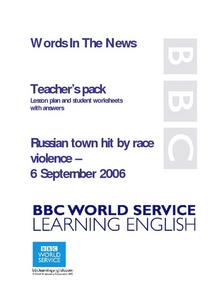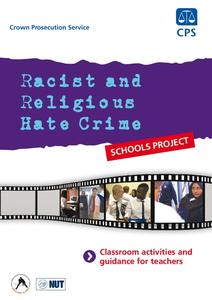Curated OER
Is Racism Dead?
Students investigate events surrounding the integration of Little Rock (Arkansas) Central High School and explore racial harmony in their own school. Included: A survey to determine whether racism is dead at your school.
Curated OER
Racism In Football
Students look at ways of tracking racism. Students define racism. Students chart out different types of racism and discrimination. Students show examples of racism discrimination.
Curated OER
Learning About Racial Discrimination
Third graders engage in a lesson that is about the study of racial discrimination with the focus upon Martin Luther King Jr. They conduct research using a variety of resources and fill out a graphic organizer looking for information.
Curated OER
Racism in Russia
Students investigate the issue of racism and demonstrations in Russia. They define key vocabulary words, explore websites, complete worksheets, answer discussion questions, and write a report from the point of view of an eyewitness of...
Curated OER
Farewell to Manzanar: Racism and Point of View
Pupils create a presentation on the computer of the reactions and memories of people who were around during the attacks at Pearl Harbor. In this Pearl Harbor lesson plan, students interview people who were there, discuss the racism, and...
Curated OER
International Day for the Elimination of Racial Discrimination
Students investigate the pass laws that resulted in the Sharpeville Massacre. In this racism lesson, students find information about the massacre and attempt to find similarities to their own lives. They determine how similar incidents...
PBS
Who, Me? Biased?: Understanding Implicit Bias
A 10-page interactive explains different facets of implicit bias, demonstrates how implicit bias works, and how people can counteract its effects. The interactive tools permit users to save their information in "My Work" folders, to take...
Facing History and Ourselves
Preparing Students for Difficult Converstaitons
Many of the issues facing 21st Century learners are challenging and even discussing these issues can be a challenge. So how do teachers prepare learners for these difficult conversations? How do instructors create a safe classroom where...
Facing History and Ourselves
The Importance of a Free Press
"Congress shall make no law . . . abridging the freedom of speech, or of the press;. . ." Why is this guarantee of free speech and a free press the First Amendment to the US Constitution? Why are these rights so essential to a...
Facing History and Ourselves
Hands Up, Don't Shoot!
Why is it so difficult to develop a clear understanding of the events surrounding the shooting of Michael Brown by a Ferguson, Missouri, police officer? To answer this question class members listen to a NPR discussion of the findings of...
Facing History and Ourselves
The Impact of Identity
How does identity influence the way people respond to events? That is the central question class members grapple with as they examine a political cartoon, read a vignette by Sandra Cisneros, watch of video of police officers discussing...
Facing History and Ourselves
How Journalists Minimize Bias
Class members are challenged to write a neutral news story about the events they observe in a short video. After sharing their stories in groups and discussing the different perceptions, the class concludes with a video of...
PBS
Making Change: Revolutionary Tactics of the Civil Rights Movement
The film American Revolutionary: The Evolution of Grace Lee Boggs introduces viewers to the differing philosophies of and strategies employed by 1960s civil rights leaders such as Malcolm X and Martin Luther King, Jr. and the debate over...
Respect for All Project
Let's Get Real Curriculum Guide
"Let's Get Real," a documentary about cyberbullying, is the cornerstone of a curriculum guide intended to help instructors design an anti-bullying unit for middle school classes. Packet with suggestions for how plan the unit,...
Crown Prosecution Service
Racist and Religious Hate Crime
Address the current political climate with a series of thought-provoking activities. A resource packet provides pupils with strategies for challenging racist behavior and religious prejudice, and moves them from being passive bystanders...
Facing History and Ourselves
Emmett Till: Confronting the Murder
The 1955 murder of Emmett Till is often regarded as the catalyst for the Civil Rights Movement of the 20th century. Learn more about the brutal crime—and, as many believe, the miscarriage of justice—that began a national conversation...
Curated OER
Language Arts, Social Studies, African Americans, The Blues, To Kill A Mockingbird
African American history during the Jim Crow era includes encounters with poverty, racism, disrespect, and protest. Harper Lee develops all four of these themes in her famous 1960 novel, To Kill a Mockingbird. To help learners understand...
City University of New York
African Americans and the Populist Movement
Why did the Populist Party fail to ally itself with African American farmers? To answer this essential question, class members investigate the Populist Era (188-1900) and read an article written by Tom Watson, a Populist leader.
Curated OER
Rosa Parks Changed the Rules
Students complete a diagram of the Montgomery bus that carried Rosa Parks into the history books. They read about Rosa Park's contributions to the Civil Rights movement. They role play Rosa Park's refusal to move to the back of the bus.
National Park Service
Civil War to Civil Rights: From Pea Ridge to Central High
Explore how the Civil War impacted the Civil Rights Movement. Class members complete a series of projects for a unit that uses a layered curriculum approach to learning.
Library of Virginia
Antebellum Freedom
From indentured servitude to involuntary race-based servitude, slavery has taken many forms in American history. Class members examine three manumission petitions that reveal how the rights of African Americans and African American...
C-SPAN
14th Amendment Equal Protection Clause
Two Supreme Court cases, Plessy v. Ferguson and Brown v. Board of Education take center stage in a lesson about the Equal Protection Clause of the 14th Amendment. Class members research both cases to compare and contrast the rulings.
C-SPAN
Voting Discrimination and the Effects of Shelby County v. Holder
Show young scholars that every vote counts as they debate the federal government 's role in protecting voting rights in historically racially discriminated areas. In the Supreme Court case Shelby County v. Holder, the high court...
Curated OER
Excerpt: Cecil Rhodes' Confession of Faith (1877)
Consider the words of Cecil Rhodes after reading this short excerpt from his publication, Confession of Faith. Upper graders read the excerpt then answer two questions analyzing the view of Africans toward his praise of British...

























